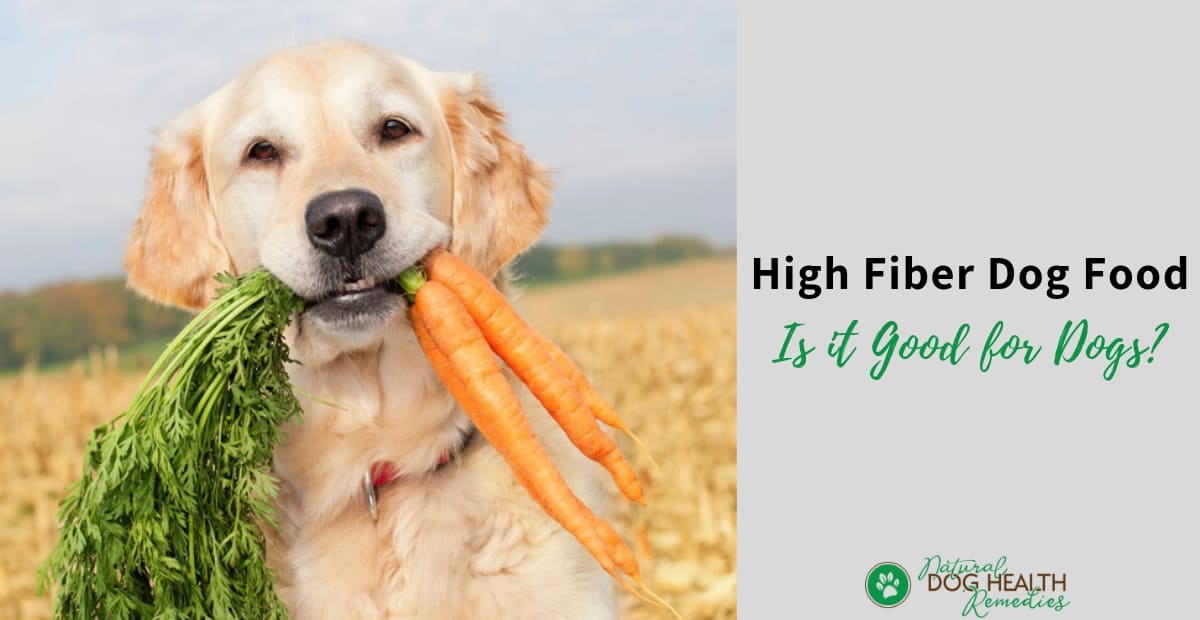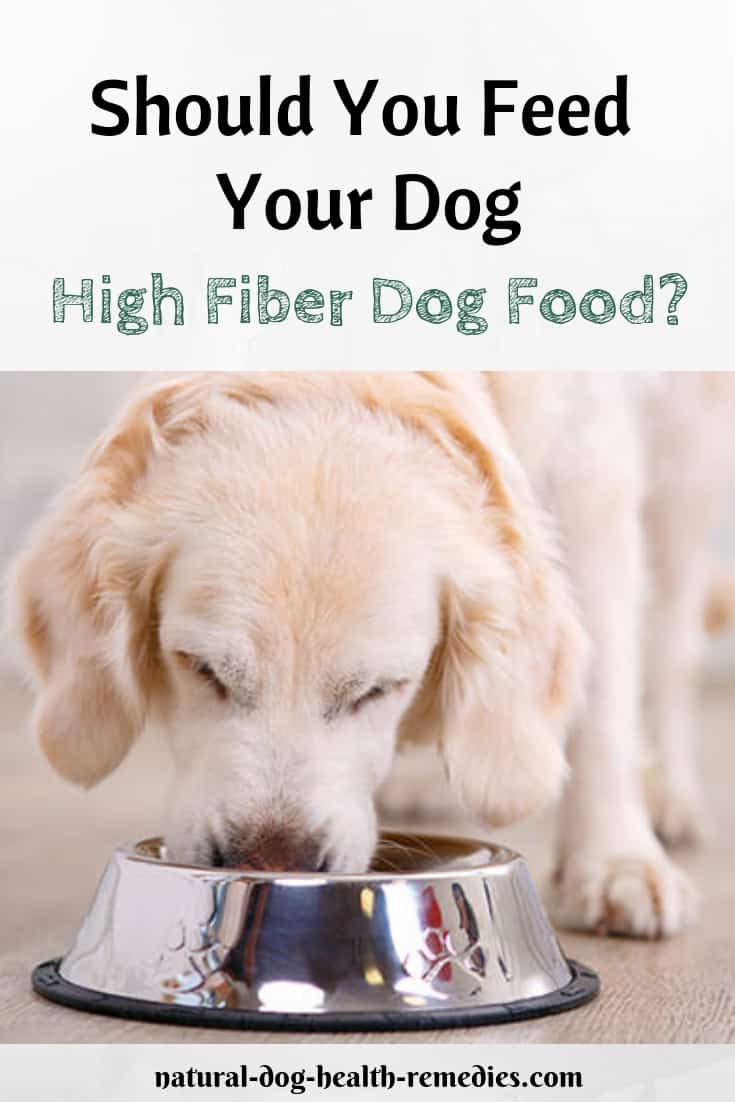Is High Fiber Dog Food Good for Dogs?

Many dog parents wonder if high fiber food is necessary for their dogs. Indeed, there is a lot of information indicating that dog food high in fiber may benefit dogs, such as older dogs, and those with certain health issues such as constipation, diarrhea, obesity, and so on.
However, some such information floating around the Internet is nothing more than myths.
Fiber Sources in Dog Food
Fiber is basically the insoluble carbohydrates that resist enzymatic digestion in the small intestine, and is mostly found in the cell walls of plants and grains.
In other words, carbohydrate sources such as grains (e.g. rice, oat), soybean, corn, etc. are high fiber sources.
If you look at the ingredients of a high fiber dog diet, the fiber sources come mostly from grains, corn and corn-byproducts, rice bran, etc.
However, dogs are carnivores, and a diet that is high in fiber and carbohydrates (e.g. with grains as the first or second ingredient) is not species-appropriate for dogs.
Too much fiber in the dog's diet will not only make the dog poop more, but the extra fiber in the dog's small intestine can also interfere with the proper absorption and assimilation of nutrients such as minerals, vitamins, and antioxidants.
High Fiber Dog Food for Special Health Issues?
How about dogs with special health issues such as constipation, diarrhea, or obesity? Doesn't high fiber dog food help with these problems? You may wonder.
Let's try to answer these questions:
- Is High Fiber Dog Food Good for Dogs with Gastrointestinal Problems?
- Can High Fiber Food Solve Anal Gland Problems?
- Can High Fiber Dog Diets Prevent Obesity?
- Do Older Dogs Need High Fiber Dog Food?
Is High Fiber Dog Food Good for Gastrointestinal Problems?
Dogs with the occasional diarrhea or constipation can benefit from the additional fiber given to them as and when needed. For example, canned pumpkin can be used as an added fiber source to treat constipation and diarrhea.
There are also other fiber sources such as dark green leafy vegetables that can be used to prevent constipation in dogs.
However, it is not recommended to regularly feed dogs a diet that is high in fiber (in other words, a high-carb diet) to prevent constipation or diarrhea.
Can High Fiber Food Solve Anal Gland Problems?
In dogs, the anal sacs contain a powerful, foul-smelling substance. When a dog poops, the pressure of the stool presses on the glands, releasing some of the secretion and therefore the anal sacs are emptied out (or "expressed").
However, if a dog suffers from constipation or if the stools are not hard enough, the anal glands cannot be emptied out, resulting in a condition called anal gland impaction.
Some people suggest that dogs prone to impacted anal glands should be fed high fiber dog food to prevent constipation in order to prevent anal gland problems.
Again, there are other better ways to prevent constipation and anal gland impaction than a diet high in fiber. Feeding a species-appropriate diet (that is, grain-free and high in good quality protein) supplemented with probiotics and digestive enzymes, as well as regular exercise are two such appropriate ways.
Can High Fiber Dog Diets Prevent Obesity?
Many commercial dog diets for "weight control" commonly are high-carb and high-fiber. They claim that the extra fiber in the food acts as "fillers", making the overweight dogs feel full without adding calories.
This may be true, but if the food contains too much fiber and not enough high quality protein, the dog will become under-nourished and will actually feel hungry all the time.
A much better way to control your dog's weight is to feed your dog a high-protein, low-carb diet, with careful control of calorie-intake.
Minimizing treats and having regular exercise that can burn off extra calories and build muscle tone are also important.
Do Older Dogs Need High Fiber Dog Food?
 Some people are under the impression that older dogs do not need as much protein, and so high fiber dog food is appropriate for older dogs.
Some people are under the impression that older dogs do not need as much protein, and so high fiber dog food is appropriate for older dogs.
Many pet food companies also make dog parents believe that older dogs are less active and prone to obesity. Therefore they should be fed special foods, and we can find different "senior formulas" in commercial dog foods, which in essence are formulas high in fiber, low in protein and fat.
However, these so-called senior formulas often have the opposite effect from which they are originally intended. Dogs deficient in protein and fat are always hungry at a cellular level. As a result, they crave and beg for more food.
Because they cannot get enough nutrients for different body functions, they often end up with skin and other organ problems, loss of lean body mass, compromised immune systems, and drug hypersensitivity.
As well, not every old dog is overweight and need "reduced calorie" diets.
In fact, as dogs age, they are more prone to develop appetite loss (due to an underlying disease or just a loss or reduction in the sense of smell and/or taste). They are also more likely to suffer from conditions such as joint pain or osteoarthritis which may lead to muscle atrophy. All these result in weight loss instead of weight gain!
More importantly, they need high-quality protein for much needed nutrients for their muscles! In fact, a veterinary nutritionist (Dr. Delmar Finco) found in 1992 that as our dogs age, their protein requirements actually increase.
Instead of feeding a senior dog a high fiber dog food, therefore, offer a variety of high-quality animal proteins (e.g. lamb, fish, beef, chicken, dairy products, eggs).
If your senior dog is overweight, do not cut down on the quantity of protein, reduce the amount of food intake instead. Also cut down on fats. For example, use low-fat dairy products and lean cuts of meats.
In Conclusion
As you can see, high fiber dog food is not species appropriate and should not be fed regularly to dogs. A raw diet or a natural balanced home-cooked diet is recommended.
ReferencesL. Olson, Raw and Natural Nutrition for Dogs: The Definitive Guide to Homemade Meals (North Atlantic Books, 2010).
W.J. Dodds, D.R. Laverdue, Canine Nutrigenomics - The New Science of Feeding Your Dog for Optimum Health (Dogwise Publishing, 2015).
Healthy Pets with Dr. K. Becker.





